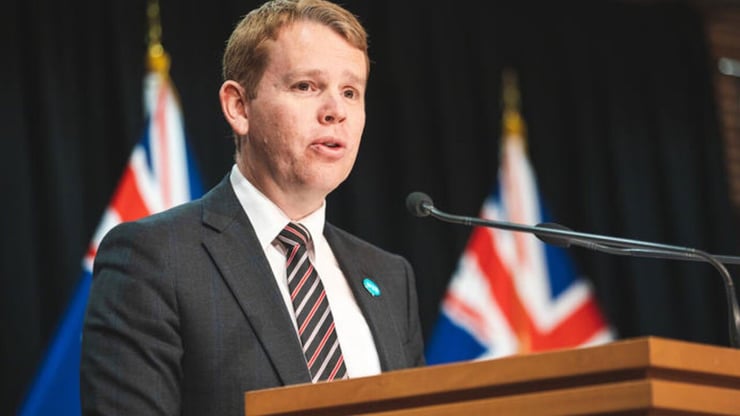Police Minister announces new measures to help tackle gangs

Police will have expanded powers for dealing with gang violence including a new intimidation offence, but stronger search and seize powers will still need a warrant.
Police Minister Chris Hipkins and Justice Minister Kiri Allan have this morning announced plans detailing the government's efforts to crack down on gang activity.
Their proposals would see a new criminal offence introduced which would make it illegal to discharge a firearm with an intent to intimidate, which would apply in any setting - a strengthening of the current law which applies only inside a dwelling.
The new crime would carry a maximum five-year prison sentence.
Police search and seize powers would also be expanded:
- Warrants could allow searches of occupied gang properties and vehicles over 14 days
- The threshold for impounding gang vehicles involved in convoys will be lowered to include aggravated carelessness and reasonable belief the vehicle was used for dangerous or reckless driving
- Cash over $10,000 found in suspicious circumstances can be seized for up to seven days
- Watches, jewellery, precious metals, stones and ships that could be used for money laundering will be added to a list of goods which high-value dealers will be prohibited from selling for cash over a certain value
Violent crime has been on the rise around the country, including in relation to a conflict between the Killer Beez and Tribesmen gangs, and the government has been under pressure to do something about it.
Hipkins said more than 1800 firearms, and 10,000 grams of methamphetamine had been seized, and 1500 arrests made as part of operation Tauwhiro.
"But as a government we are keen to make sure that we can do more and that involves making sure that the police have the right tools to do that."
Police are responding to increased incidents of intimidation and violence on roads, streets and in homes, Hipkins said.
The opposition National Party has been calling for a ban on patches and gang gatherings, although gang leaders decried that policy as 'dog whistle' politics and expert Jarrod Gilbert warned it would do little to address the problem.
Gilbert warned more broadly against listening to politicians with easy answers to gang violence, saying what was needed was to tackle the specific symptoms and causes of crime, while putting pressure on the gangs through policing.
Allan quoted Dr Gilbert, who said solutions were needed to target particular problems.
"This has been the approach that we have taken since we have pulled together this suite of reforms. One of the current problems New Zealanders are worried about - and rightly so - is the spike in gang warfare, as evidenced just here," Allan said.
She said going after guns, vehicles and cash was hitting the gangs where it hurt.
"New Zealanders have the absolute right to feel safe in their homes and the police need the adequate powers to do their job. The ministry of justice have worked closely with police to design the suite of targeted measures, to ensure police have the tools that they need to tackle violent organised criminal behaviour whilst also ensuring that the measures are evidence-based and uphold the rule of law."
We all know people did not become gang members overnight, and the government was "acutely aware" the best tool was prevention, rather than "a belated cure", Allan said.
Hipkins said police had asked for stronger powers to allow them to deal with violent offending and other criminal activities.
"Recent brazen gang activities have been totally unacceptable and our communities deserve better," he said.
"These are practical and targeted measures that will help the police do their job to keep communities safe. We are interested in real solutions, not empty slogans."
He said there was also work being done to address the drivers of crime including youth crime.
Allan said the causes of crime were complex and often inter-generational, and the changes being introduced would give New Zealanders confidence that police had the powers they needed to tackle gang behaviour that made them feel unsafe.
"We will continue to ensure we are upping the ante on intervention and prevention measures that are focused on steering young people away from a life with organised criminal groups," she said.
"I will be looking closely at the youth justice system in particular to see how we can make changes that will improve both the lives of at-risk young people and public safety over the long term."





